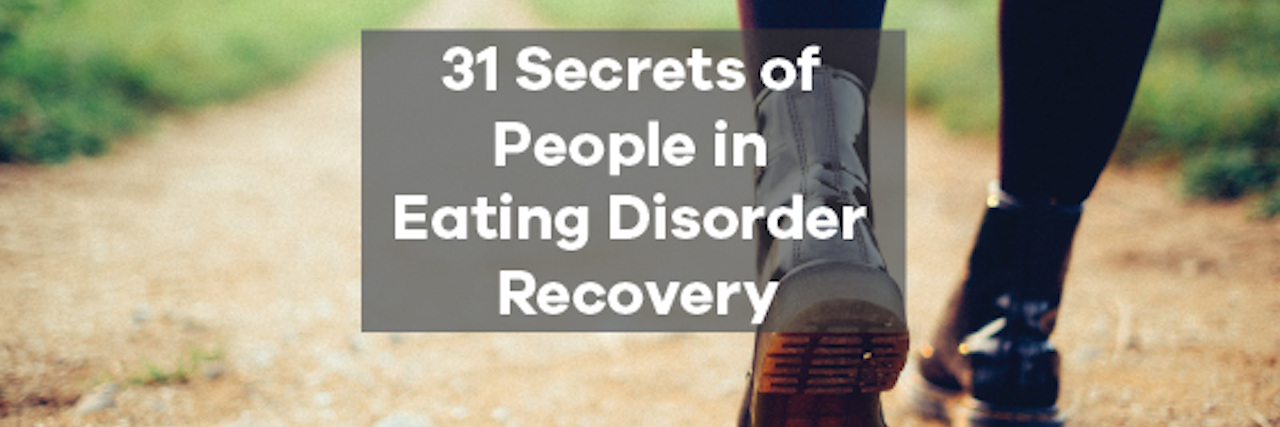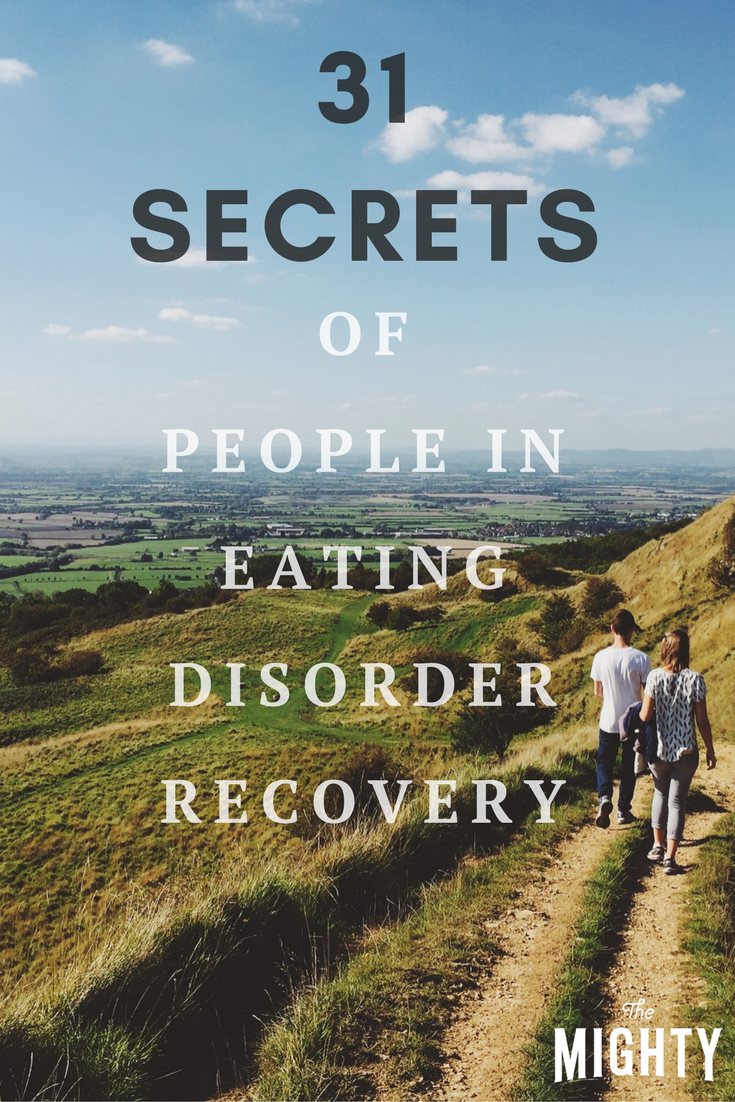Everyone says, “Recovery isn’t a straight line.” And the truth is, that’s the truth.
Eating disorder recovery isn’t a one-size-fits-all process. There is no set path or magical potion you can take for an overnight “cure.” It requires a lot of difficult days filled with confronting old fears and challenging negative coping mechanisms. But it is also filled with a lot of good days celebrating those achievements.
From the outside looking in (or even the inside looking in), the haphazard process of recovery can be incredibly difficult to understand. That is why we asked our Mighty mental health community, what is one “secret” they wished other people understood about eating disorder recovery.
Here is what they had to say:
1. “It is about more than the food. It is about more than the exercise. You can have food and exercise under control, but there are other symptoms that are just as debilitating. Once you’ve lived with an eating disorder, when you struggle, everyone automatically thinks it’s the eating disorder you are struggling with. No one seems to understand that sometimes other mental health issues run hand in hand.” — Madison K.
2. “Eating disorder behaviors aren’t for attention seeking, but are negative coping skills and a result of trying to deal with thoughts and emotions that are incredibly difficult to process.” — Tyler B.
3. “Eating is stressful. Just the idea of owning particular foods is stressful. Not being in control of meals and meal times is stressful. And, underlying it all, life is stressful, to the point where it feels like someone set the world on fire. And that’s why giving up eating disorders are so hard — because it’s hard to find another way to numb the intensity.” — Jo F.
4. “Please don’t take it personally if I choose not to eat what you make or when I say no to dessert. And I’m not being antisocial when I don’t go out to eat with you and my other friends.” — Tracey C.
5. “Even though I’m in recovery and have done so much work to get healthy, I still struggle with restaurants that list calories and it takes a lot of effort every day to not slide back.” — Alyse W.
6. “It has taken many years to get comfortable with my weight not equating it to my value as a human being. I don’t want to hear about or talk about your diet. I can’t be a part of that for my mental health.” — Mary C.
7. “We are not a Netflix series.” — Sara H.
8. “Recovery is an ongoing process and something I need to be constantly aware of. I may be in recovery, but healing is a never ending journey.” — Mandy L.
9. “My body and mind haven’t recovered at the same pace.” — Rebekah D.
10. “Just because I have a day where I am having a hard time staying recovery focused, doesn’t mean I have relapsed. Recovery is not a straight line.” — Bethany D.
11. “Eating disorders are not limited to body size. Fat people can suffer as much as thin people. Eating disorders can affect anyone of any size, of any age, gender and sexuality.” — Emma J.
12. “Recovery is a very lengthy process. There is no magic wand to make it disappear overnight. Recovery takes endless persistence and determination.” — Emily C.
13. “Assigning moral value to food is harmful, especially in average conversation. Telling someone who is in eating disorder recovery they are being ‘so good’ by eating a salad isn’t appropriate.” — Annonymous
14. “The time I spent in a treatment center wasn’t a quick fix for 22 years of battling. It was meant to teach and prepare me for finally fighting back against this illness and it takes support and encouragement from everyone around me to keep going.” — Jessica N.
15. “Just because I’m in recovery, it doesn’t mean I’m now absolutely fine and cured! I will still struggle and slip up, but I will also gain strength and learn more about myself as I go along. Recovery for me is a lifelong journey, and it will not always be easy, but it will always be worth it.” — Jenn I.
16. “Just because I’ve been in recovery for years doesn’t mean it’s suddenly acceptable for you to comment on my body.” — Nyssa W.
17.“Just because I’m eating a ‘normal’ sized meal doesn’t mean I’m completely recovered.” — Adrianna W.
18. “Just because I look healthier and I can eat around others doesn’t mean the fight in my mind is over. Also I have no wish to discuss other people who may have an ED — your weight, or food or diet struggles. Now I can’t control what people say in front of me, but I can control my response; in this case, it’s switching off. So if you notice I don’t appear to be taking notice of you while discussing those topics, I’m protecting myself for the sake of my recovery.” — Monefa W.
19. “Anytime I don’t eat something, [you] don’t need to force food down my throat in an attempt to help me. Sometimes I don’t eat because I’m sick. Sometimes it’s because I just ate. I’m recovering from an eating disorder, but I’m still human.” — Gabriela R.
20. “Men have it just as bad.” — Samuel G.
21. “When I say, ‘You don’t understand,’ it’s not a slight or personal attack. Until you’ve lived this, sometimes even the most well-intentioned advice goes on deaf ears. Sometimes I can eat a meal in front of my family, friends and my boyfriend without issue; sometimes I struggle through it with all my might and try desperately to not indulge in old behaviors. If I could pick and choose the dates and times where I’d struggle and maybe even relapse, I would in an instant.” — Clare C.
22. “I wish people understood anorexia doesn’t always have something to do with peer pressure and social media. I developed anorexia because it was the first thing that ever gave me control; my body dictated my every move because I was born with a rare disease. Every time I felt like my body held me back (which was always), I deprived myself of the only thing I could — food. To this day, I still have to choose recovery, and that may be a lifelong process.” — Marie A.
23. “I don’t want to talk about my weight or food. If I’m struggling, it’s best to change the subject and help distract me from those thoughts! I can use all the help I can get doing that.” — Jane A.
24. “How hard it is to replace a form of control, a form of self-harm, with healthier coping habits. There’s good days and bad days. No matter how well I feel on any given day, I always still an underlying urge to stop fighting and give up. But I don’t. The fight is worth it.” — Chelsea M.
25. “I’m not looking for diet advice. People think binge eating equates to needing to fix what I’m eating and they don’t realize that it is strongly connected to emotions. The issue is not with the food, the issue is deeper within myself.” — Jessica E.
26. “Size doesn’t matter and my treatment is not a weight loss plan. Asking me how much weight I have to lose is very, very counterproductive.” — Katie B.
27. “Even after recovering, there is still a huge hole in my life where my eating disorder used to be and I have no idea what to fill that hole with.” — Abbie A.
28. “When you comment on other women’s bodies in a negative way, I internalize it and it lowers my self-image.” — Karissa W.
29. “It’s not about feeling ‘fat,’ it’s about feeling constantly like you are not good enough.” — Lisa B.
30. “I need time and space to continue growing. Recovery for me is learning to really step back into life, and that’s a big challenge for someone who has lived in an ED for so long.” — Georgia C.
31. Whether you are just entering the first stages of recovery; if you’re returning back for the second, third or sixth time; or if you’ve been in recovery for a while now, never doubt your progress or your bravery. Recovery is not easy — and always remember, there is help and you are not alone.
If you or someone you know is struggling with an eating disorder, you can call the National Eating Disorders Association Helpline at 1-800-931-2237.


